06 Jun Lifting Up the Homeless
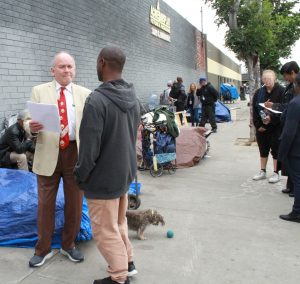
Deputy Public Defender Gil Mares helps a client experiencing homelessness with expungements at an encampment on S. Broadway.
The man with eyes that revealed his painful past stood amid a crowded homeless encampment on S. Broadway talking to a LA County deputy public defender.
The LA County Public Defender’s Homeless Outreach Unit is setting the stage for his rebound.
An owner of two businesses — home repair and property management — the man was the sole survivor in a horrendous crash caused by a drunken driver. He lost chunks of muscle from his back and thighs and was hospitalized for six months, two in a coma.
He lifted his shirt to prove his injuries, exposing a massive scar that covered his lower back. Losing his businesses and home pushed him to the streets. A single father, his son went to relatives.
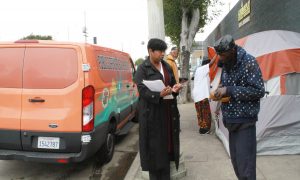
Deputy Public Defender Judith Johnson assists people at a homeless encampment.
Homeless Unit Works with CBOs
Sober for five months, he is physically and mentally ready to start over. While at a community-based organization (CBO) located near homeless encampments, he saw one of the Public Defender’s brightly colored “help squad” vans and took a business card from an attorney.
He followed up and met with Deputy Public Defender Gil Mares to begin the process of expunging his record. He said he was eager to return to the workforce.
“I want to get the expungements so I can get my license back and maybe drive for a living,” the man said. “I can no longer do repairs or property management because of my injuries. I’m so grateful for the homeless expungement program. They reach out to people who would not know this program existed.”
Head Deputy Justine Esack, who oversees the Homeless Unit, said the man was exactly the kind of client who can benefit from the services.
“The people we serve have had mental health and medical help and other services from community-based organizations, so they’re ready to deal with their criminal records,” Esack said. “They need record clearing because they’re looking for permanent housing and jobs. They’re still homeless but they’ve dealt with some of their demons.”
Vans to be Fully Equipped
Launched in January 2018 with Measure H funds, the homeless outreach team works with various CBOs and drives their two vans and SUV to places where people experiencing homelessness live. The vans are currently being outfitted to become full mobile offices with the technical ability to gather clients’ court dockets electrically even at remote encampments. This way, forms necessary for expungements can be completed at locations without a power source.
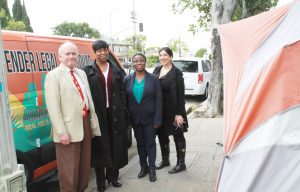
Some members of the team in front of their “help squad” van from left: Deputy Public Defenders Gil Mares and Judith Johnson, secretary Valaura Baker and Head Deputy Justine Esack.
Now, when team members provide services at a CBO location with a power source, they research the clients’ cases, print out the paperwork and prepare them for filing while in the field. Unlike typical expungements, the attorneys represent each client in court so they need not appear.
Esack said the three deputy public defenders, three paralegals and three secretaries were chosen because they expressed a deep commitment to the assignment. “I am so proud of this hardworking team,” she said.
The team works with CBOs to identify those who are homeless, but have received some mental and medical care preparing them to reenter society.
Showing Clients Respect
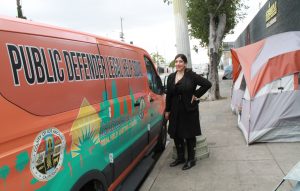
Head Deputy Justine Esack oversees the Homeless Outreach Unit.
“What we don’t do is drive our van up to somebody’s tent, knock on the tent door and say, ‘Hey, do you want an expungement?’ ” Esack said. “We want to show our clients the right kind of care and respect and part of that is knowing when we are not the people they need to see at that particular time.”
They see the homeless team after they address some of their issues and are ready to “get down to the nitty gritty of life,” she said.
“They’re ready at that point to present themselves back to the world again. And that’s where we step in.”
That day, teams were sent out to two separate areas to serve clients who are homeless. The program has grown from four to nine employees, plus the head deputy, and is still evolving.
For example, Esack hopes to add social workers.
“Sometimes we come across clients who are acutely mentally ill and need the intervention of someone who is a trained mental health professional,” Esack said. “I would like to see somebody from the mental health field be able to intervene and who could assist our clients in that way.”
Like all homeless encampments, the one on S. Broadway has seen its share of drama, further traumatizing people already on the edge. Recently, someone walking by threw a lit match at one of the tents setting it aflame. Its occupant escaped unharmed but lost his tent and last possessions.
Giving People Their Lives Back
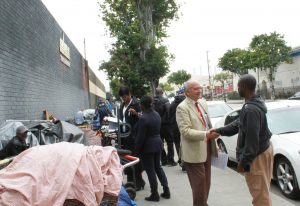
DPD Gil Mares shakes a client’s hand at homeless encampment.
“This is no way to live,” said the man being helped by Mares. “What this program is doing is really big. It’s huge. You’re giving people their lives back.”
Later, Mares said he believed that the man was on his way to reentering society.
“He was a productive member of society with his own business until a horrific accident put him in a coma for several weeks,” said Mares, who has been with the unit since its inception. “He’s employing our record-clearing services to help him get back into the workforce and back into permanent stable housing. He has a positive outlook and believes he will accomplish his goals.”
The man will be added to the 2,102 people the homeless unit has assisted from its inception through March 2019.

